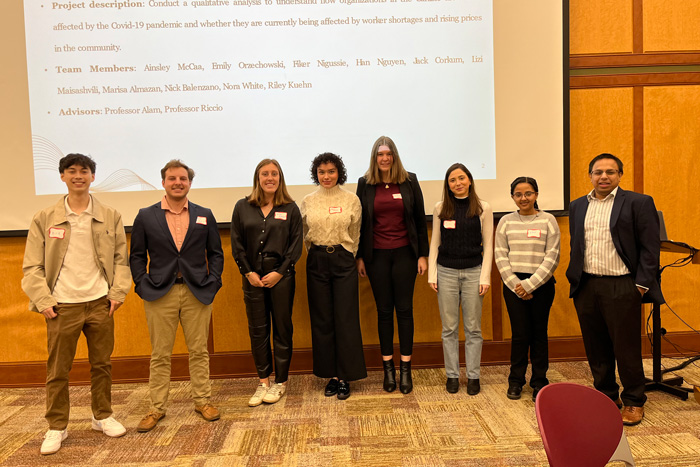Student-Faculty Research Dives Into Local Businesses and Post-COVID Challenges

Once the survey results were in and the project was wrapped up, students (seen here with Associate Professor of Economics Shamma Alam, far right) presented their findings to community members and Dickinson senior staff, including President Jones.
Dickinson-Carlisle research project sends students into the community to learn about business issues
by Tony Moore
Rising costs, staffing hurdles, a dash of economic uncertainty. Like others across the state, region and world, Carlisle's businesses have weathered quite the storm these past few years. But they're showing grit, resilience and a healthy amount of optimism.
That's the takeaway from "Carlisle Economy Post-Pandemic Recovery Research," a new study Dickinson economics students conducted over the course of several months in the fall. Through in-depth interviews with 58 local businesses and nonprofits, they dove into the heart of how the pandemic has reshaped the Carlisle community.
The Outlook
“We anticipated that businesses would predominantly express pessimism due to the recent challenges posed by the pandemic, high inflation and worker shortages, but our research yielded several unexpected findings,” says Associate Professor of Economics Shamma Alam, adding that 81% of those surveyed expressed optimism about their future. “Despite media speculation about a looming recession, most organizations do not foresee one in the near future, citing their current robust performance—but we observed variations in sentiment among different types of organizations, such as nonprofits, retail, service-oriented and restaurant businesses.”
In the face of challenges, many organizations have adjusted their operating hours to attract workers, but despite facing higher costs and staffing shortages, most businesses reported increased consumer traffic and higher profits (or revenue for nonprofits) compared to pre-pandemic levels.
A Hands-on Experience
Working their way through the survey process and the waves of data coming in not only allowed students to get a better grasp on the local economy and sentiment around it; it also allowed them to hone their research skills.
“I now have a better understanding of how these national news stories and trends have been affecting the local Carlisle community,” says Nora White '24 (economics, international studies), one of the student researchers. "Out-of-classroom learning opportunities have had a significant impact on my experience at Dickinson, and this research project has allowed me to apply and build upon the skills I’ve developed in the classroom, attaining a lot of hands-on research experience that I would not have gained in any other setting."
The information they uncovered is surprising at times and probably expected at others, especially to restaurant-goers:
- 67% of businesses increased their prices, ranging from 6% to 10% annually.
- A little over half of businesses observed a higher customer frequency this year compared to last year.
- The challenge that was mentioned by most organizations was related to worker shortages and staffing.
- 70% of organizations indicated that they have actively looked to hire new employees in the past year.
- 66% of surveyed leaders mentioned a need for further government and nonprofit assistance, including grants, community resources and loans, despite the woes of the pandemic being chiefly in the past.
Data and the Community They Represent
Despite having to overcome challenges, 95% of organizations studied view Carlisle as an excellent place to conduct business, citing the community, resources and wide demographics in particular. And they were also pleased with the research project, as students discovered when presenting the results to the business owners/managers, community leaders, Carlisle Chamber of Commerce members and senior Dickinson leadership, including President John E. Jones '77, P'11.
“In addition to gaining research experience, it was crucial that our project was beneficial and informative for the Carlisle community,” says Lizi Maisashvili ’24 (quantitative economics), noting that after examining the final project findings, community representatives were enthusiastic about future use of the research. “It’s evident that a project of this nature enables students to use their academic knowledge and all the experience acquired in the classroom to do something meaningful that will have impact the community—and to see the actual people behind the data that are sometimes lost through mere statistics.”
TAKE THE NEXT STEPS
Published February 28, 2024